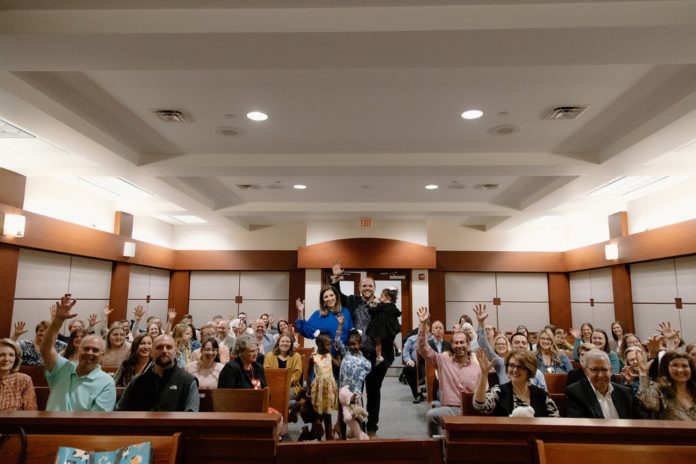
By Mariah Bennett | Staff Writer
Baylor alumni Meredith and Sterling Shanks attended Baylor Homecoming in 2019 with two young girls they were fostering. At the time, the girls were placed with the couple as an emergency placement, but it has since turned into a forever home.
Three years later, the Shanks are planning to return for Baylor Homecoming as a family, with a third daughter in the picture. On April 14, the couple adopted three girls: 8-year-old Ke’lona, 7-year-old Lai’Anna and 2-year-old Ea’lona.
Meredith said her daughters are ecstatic to attend homecoming for the parade, candy and football game, as well as to see the community of “Baylor friends.” She said the family is currently teaching Ea’lona how to do a Sic ’em.
“She’s doing pretty good,” Meredith said. “She’s going, ‘Bears!’”
The girls’ love for all things Baylor was highlighted in an Oct. 7 Instagram Reel made by Sterling. The video included the two eldest girls celebrating homecoming a few months after they were placed with the couple. Sterling, a fourth-generation Bear himself, said he felt nostalgic when seeing the video and decided to post it.
“Baylor is just something that’s near and dear to us,” Sterling said. “We were excited to share that with them … So it’s our first time taking them to Baylor, legally, as our family.”
However, the family’s story starts a few years before 2019, when Meredith and Sterling met as next-door neighbors while attending Baylor. Meredith said while the two were dating, they began talking about future plans and their desire to adopt children one day. Later, when the Shanks began the process of growing their family, they said it looked like it wasn’t going to be a possibility biologically.
“We were like, ‘Well, we always wanted to adopt,’” Meredith said. “And so we started praying about what avenue that was going to look like. We felt like God put foster care on our hearts … and we just answered the call.”
Before their daughters came into their lives, the couple had fostered another child who ended up returning to live with their family.
“We know and fully support reunification when it’s possible,” Meredith said. “We took foster care as our opportunity to minister to the birth family, whether that was taking care of that child for a period of time … or taking care of them forever.”
Meredith said it’s important to know the birth families of children in foster care do love them. Sterling said stereotypes of birth families are a misconception.
“They just had different circumstances that made life harder, and that’s not necessarily often their fault,” Sterling said. “That is why foster care, foster parents and respite care providers are needed, because sometimes you just need to minister that family because they’re in a hard place.”
Sterling said there have been many times he has been told the couple’s former placements or daughters “don’t seem like foster kids,” due to stereotypes.
“They’re kids, like any other kids,” Sterling said. “They just need their needs met and to be loved.”
Meredith said when it comes to adoption, it’s best if children can have a healthy connection to their birth family when possible.
“Adoption can be beautiful when those two families can come together,” Meredith said.
Sterling said it is important to know that when someone adopts a child, they must broaden their worldview and take on someone else’s burdens, culture, life and practices.
“You’re loving them well by letting their family become a part of your family too,” Sterling said. “You’re not just shoving them into a piece of your family; you’re broadening what family looks like by taking on someone when adopting them.”
Meredith said the couple received an overwhelming amount of support from their Baylor friends and community. Even people who they don’t hear from in their day-to-day life, such as sorority sisters, have reached out.
“Once we were getting placements, I had so many reach out and say, ‘Can I send you diapers? Can I help you with this? Can I send you a meal?’” Meredith said. “That’s Baylor to me … It’s a community that cares about you. They want to help and be there.”
Sterling said his time at Baylor was crucial in forming his view of foster care and adoption, as he learned a lot about humility and servanthood.
“How I would view foster care and adoption is out of the love of Jesus,” Sterling said. “You need to be there to love those kids and families selflessly, with humility and with compassion.”
Meredith said children come to placements with nothing — no beds, clothes or school supplies. She said students can help by donating to organizations like Rainbow Room, Foster Closet and others.
Sterling said another way for students to help foster families is to ask a Theta about getting involved with CASA — a nonprofit that advocates for foster care children.
Sterling said his children have radically changed how he looks at, speaks up for and treats others.
“When they were placed with us, that was right before COVID-19 and the Black Lives Matter movement,” Sterling said. “My worldview and Meredith’s changed by our family becoming an interracial family and realizing how sometimes the world treats and views people of other races.”
Sterling said before, he didn’t realize how many things in one’s life were filled with microaggressions.
“The opposite of racism is not ‘not being racist,’” Sterling said. “It’s being anti-racist and speaking up and trying to, out of humility, let other people know when something’s just not OK.”
Meredith said their daughters have changed everything for them, including how they view the world.
“It just has given me more of a heart for people,” Meredith said. “They’ve changed everything.”




